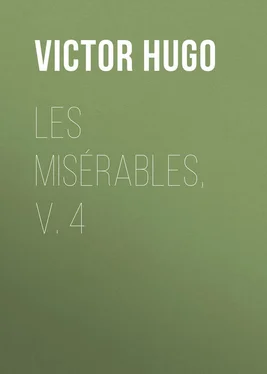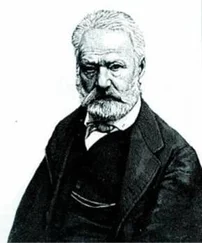Victor Hugo - Les Misérables, v. 4
Здесь есть возможность читать онлайн «Victor Hugo - Les Misérables, v. 4» — ознакомительный отрывок электронной книги совершенно бесплатно, а после прочтения отрывка купить полную версию. В некоторых случаях можно слушать аудио, скачать через торрент в формате fb2 и присутствует краткое содержание. Жанр: literature_19, foreign_antique, foreign_prose, на английском языке. Описание произведения, (предисловие) а так же отзывы посетителей доступны на портале библиотеки ЛибКат.
- Название:Les Misérables, v. 4
- Автор:
- Жанр:
- Год:неизвестен
- ISBN:нет данных
- Рейтинг книги:4 / 5. Голосов: 1
-
Избранное:Добавить в избранное
- Отзывы:
-
Ваша оценка:
- 80
- 1
- 2
- 3
- 4
- 5
Les Misérables, v. 4: краткое содержание, описание и аннотация
Предлагаем к чтению аннотацию, описание, краткое содержание или предисловие (зависит от того, что написал сам автор книги «Les Misérables, v. 4»). Если вы не нашли необходимую информацию о книге — напишите в комментариях, мы постараемся отыскать её.
Les Misérables, v. 4 — читать онлайн ознакомительный отрывок
Ниже представлен текст книги, разбитый по страницам. Система сохранения места последней прочитанной страницы, позволяет с удобством читать онлайн бесплатно книгу «Les Misérables, v. 4», без необходимости каждый раз заново искать на чём Вы остановились. Поставьте закладку, и сможете в любой момент перейти на страницу, на которой закончили чтение.
Интервал:
Закладка:
The first day that Cosette went out in her dress and cloak of black brocade, and her white crape bonnet, she took Jean Valjean's arm, gay, radiant, blushing, proud, and striking. "Father," she said, "how do you think I look?" Jean Valjean replied, in a voice which resembled the bitter voice of an envious person, "Charming." During the walk he was as usual, but when he returned home he asked Cosette, —
"Will you not put on that dress and bonnet, you know which, again?"
This took place in Cosette's room; she returned to the wardrobe in which her boarding-school dress was hanging.
"That disguise?" she said, "how can you expect it, father? Oh, no, indeed, I shall never put on those horrors again; with that thing on my head I look like a regular dowdy."
Jean Valjean heaved a deep sigh.
From that moment he noticed that Cosette, who hitherto had wished to stay at home, saying, "Father, I amuse myself much better here with you," now constantly asked to go out. In truth, what good is it for a girl to have a pretty face and a delicious toilet if she does not show them? He also noticed that Cosette no longer had the same liking for the back-yard, and at present preferred remaining in the garden, where she walked, without displeasure, near the railings. Jean Valjean never set foot in the garden, but remained in the back-yard, like the dog. Cosette, knowing herself to be beautiful, lost the grace of being ignorant of the fact, an exquisite grace, for beauty heightened by simplicity is ineffable, and nothing is so adorable as a beauteous innocent maiden who walks along unconsciously, holding in her hand the key of a Paradise. Rut what she lost in ingenuous grace she regained in a pensive and serious charm. Her whole person, impregnated with the joys of youth, innocence, and beauty, exhaled a splendid melancholy. It was at this period that Marius saw her again at the Luxembourg, after an interval of six months.
CHAPTER VI
THE BATTLE BEGINS
Cosette was in her shadow, as Marius was in his, all ready to be kindled. Destiny, with its mysterious and fatal patience, brought slowly together these two beings, all charged with, and pining in, the stormy electricity of passion, – these two souls which bore love as the clouds bore thunder, and were destined to come together and be blended in a glance like the clouds in a storm. The power of a glance has been so abused in love-romances that it has been discredited in the end, and a writer dares hardly assert nowadays that two beings fell in love because they looked at each other. And yet, that is the way, and the sole way, in which people fall in love; the rest is merely the rest, and comes afterwards. Nothing is more real than the mighty shocks which two souls give each other by exchanging this spark. At the hour when Cosette unconsciously gave that glance which troubled Marius, Marius did not suspect that he too gave a glance which troubled Cosette. For a long time she had seen and examined him in the way girls see and examine, while looking elsewhere. Marius was still thinking Cosette ugly, when Cosette had already considered Marius handsome, but as the young man paid no attention to her he was an object of indifference. Still she could not refrain from saying to herself that he had silky hair, fine eyes, regular teeth, an agreeable voice, when she heard him talking with his companions; that he perhaps walked badly, but with a grace of his own, that he did not appear at all silly, that his whole person was noble, gentle, simple, and proud; and, lastly, that though he seemed poor, he had the bearing of a gentleman.
On the day when their eyes met, and at length suddenly said to each other the first obscure and ineffable things which the eye stammers, Cosette did not understand it at first. She returned pensively to the house in the Rue de l'Ouest, where Jean Valjean was spending six weeks, according to his wont. When she awoke the next morning she thought of the young stranger, so long indifferent and cold, who now seemed to pay attention to her, and this attention did not appear at all agreeable to her; on the contrary, she felt a little angry with the handsome disdainful man. A warlike feeling was aroused, and she felt a very childish joy at the thought that she was at length about to be avenged; knowing herself to be lovely, she felt, though in an indistinct way, that she had a weapon. Women play with their beauty as lads do with their knife, and cut themselves with it. Our readers will remember Marius's hesitations, palpitations, and terrors; he remained on his bench, and did not approach, and this vexed Cosette. One day she said to Jean Valjean, "Father, suppose we take a walk in that direction?" Seeing that Marius did not come to her, she went to him, for in such cases, every woman resembles Mahomet. And then, strange it is, the first symptom of true love in a young man is timidity; in a girl it is boldness. This will surprise, and yet nothing is more simple; the two sexes have a tendency to approach, and each assumes the qualities of the other. On this day Cosette's glance drove Marius mad, while his glance made Cosette tremble. Marius went away confiding, and Cosette restless. Now they adored each other. The first thing that Cosette experienced was a confused and deep sorrow; it seemed to her that her soul had become black in one day, and she no longer recognized herself. The whiteness of the soul of maidens, which is composed of coldness and gayety, resembles snow; it melts before love, which is its sun.
Cosette knew not what love was, and she had never heard the word uttered in its earthly sense. In the books of profane music which entered the convent, tambour or pandour was substituted for amour . This produced enigmas, which exercised the imagination of the big girls, such as: "Ah! how agreeable the drummer is!" or, "Pity is not a pandour!" But Cosette left the convent at too early an age to trouble herself much about the "drummer," and hence did not know what name to give to that which now troubled her. But are we the less ill through being ignorant of the name of our disease? She loved with the more passion, because she loved in ignorance; she did not know whether it was good or bad, useful or dangerous, necessary or mortal, eternal or transient, permitted or prohibited, – she loved. She would have been greatly surprised had any one said to her, "You do not sleep? that is forbidden. You do not eat? that is very wrong. You have an oppression and beating of the heart? that cannot be tolerated. You blush and turn pale when a certain person dressed in black appears at the end of a certain green walk? why, that is abominable!" She would not have understood, and would have replied, "How can I be to blame in a matter in which I can do nothing, and of which I know nothing?"
It happened that the love which presented itself was the one most in harmony with the state of her soul; it was a sort of distant adoration, a dumb contemplation, the deification of an unknown man. It was the apparition of youth to youth, the dream of nights become a romance and remaining a dream, the wished-for phantom at length realized and incarnated, but as yet having no name, or wrong, or flaw, or claim, or defect; in a word, the distant lover who remained idealized, a chimera which assumed a shape. Any more palpable and nearer meeting would at this first stage have startled Cosette, who was still half plunged in the magnifying fog of the cloister. She had all the fears of children and all the fears of nuns blended together, and the essence of the convent, with which she had been impregnated for five years, was still slowly evaporating from her whole person, and making everything tremble around her. In this situation, it was not a lover she wanted, not even an admirer, but a vision, and she began adoring Marius as something charming, luminous, and impossible.
Читать дальшеИнтервал:
Закладка:
Похожие книги на «Les Misérables, v. 4»
Представляем Вашему вниманию похожие книги на «Les Misérables, v. 4» списком для выбора. Мы отобрали схожую по названию и смыслу литературу в надежде предоставить читателям больше вариантов отыскать новые, интересные, ещё непрочитанные произведения.
Обсуждение, отзывы о книге «Les Misérables, v. 4» и просто собственные мнения читателей. Оставьте ваши комментарии, напишите, что Вы думаете о произведении, его смысле или главных героях. Укажите что конкретно понравилось, а что нет, и почему Вы так считаете.












